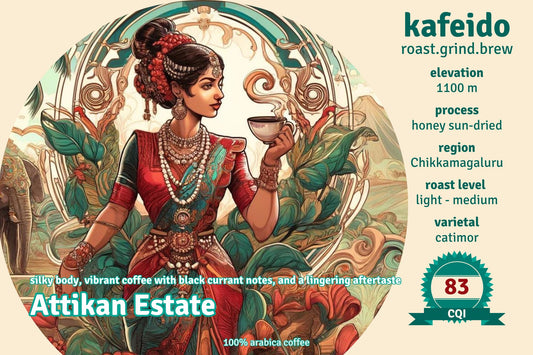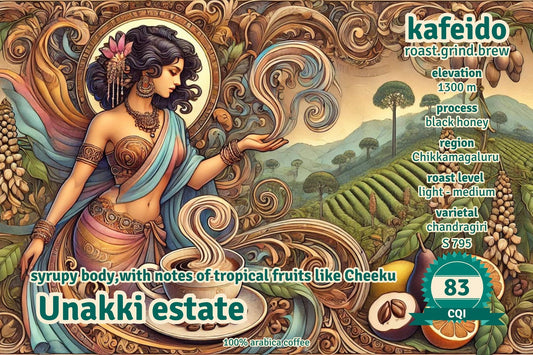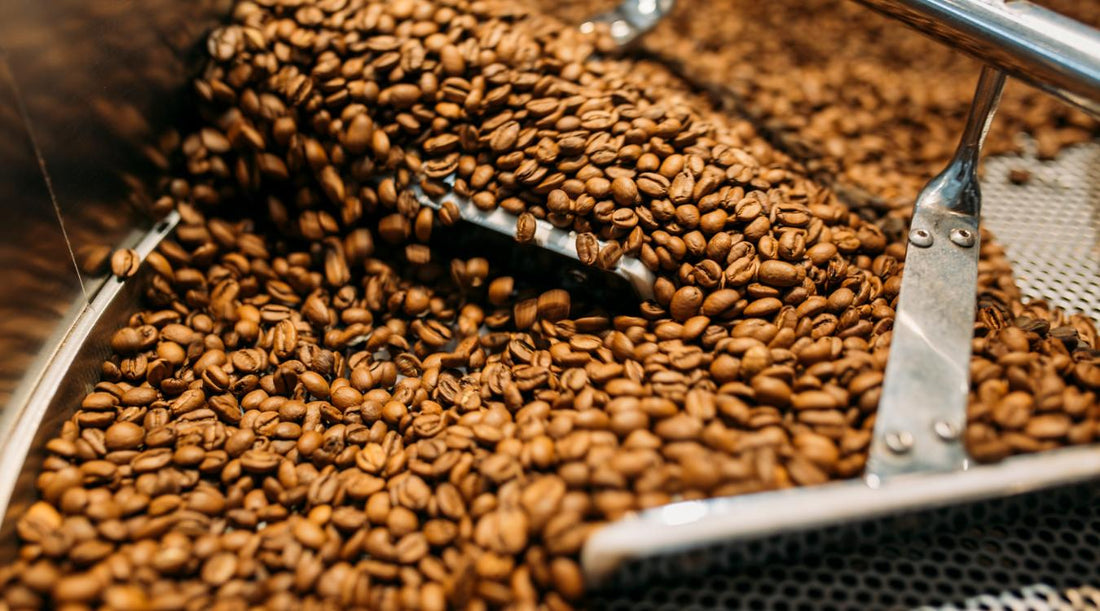
Specialty coffee roasting process: An overview & factors affecting the final flavor of your brew
Share
Specialty coffee roasting is the method of roasting coffee beans that emphasizes the unique characteristics and flavors of the beans, rather than simply creating a consistent, mass-produced product.
The specialty coffee roasting process is a highly skilled and precise endeavor that requires a deep understanding of the science and art of coffee roasting. Let's look at an overview of the roasting process:
Specialty coffee roasting process
Step 1: Sorting and Cleaning
The first step in the specialty coffee roasting process is sorting and cleaning the green coffee beans. This involves removing any impurities, such as sticks, rocks, or bad beans, from the batch.
Specialty coffee beans are typically sourced from specific regions and are of high-quality varietals, so it's important to start with the best possible beans.
Step 2: Sorting by Quality
Once the beans have been cleaned, they are sorted by quality. Specialty coffee beans are typically graded on a scale from 1 to 5, with 1 being the highest quality. Only the highest quality beans, those rated as a 1 or 2, are used in specialty coffee roasting.
Step 3: Roasting Profile Development
Before roasting, a roasting profile is developed for each batch of beans. This profile takes into account factors such as the origin, varietal, and quality of the beans, as well as the desired flavor profile.
The roasting profile is a detailed plan that outlines the specific temperature and time at which the beans will be roasted.
Step 4: Roasting
Once the roasting profile has been developed, the beans are ready to be roasted. Specialty coffee roasters use state-of-the-art equipment and techniques to ensure that the beans are roasted to perfection.
The beans are continuously agitated during the roasting process to ensure that they are heated evenly.
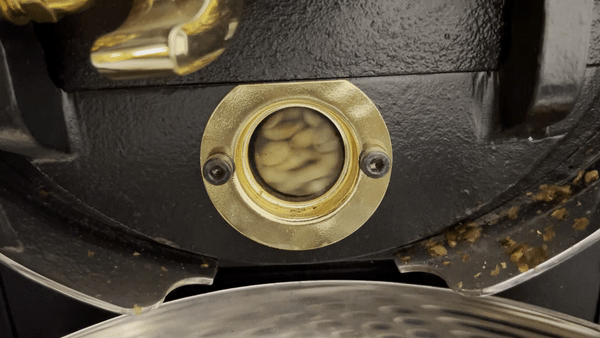
The exact temperature and duration of the roasting process depend on the specific roasting profile. However, specialty coffee beans are typically roasted at a lower temperature and for a shorter period of time than commercial coffee beans. This helps to preserve the unique flavor characteristics of the beans.
Step 5: Cupping
After the roasting process is complete, the beans are cupped (tasted) to evaluate the flavor profile. This process involves brewing a small sample of the beans and then evaluating the aroma, acidity, body, and flavor of the coffee. Any necessary adjustments to the roasting profile can be made at this stage.
Step 6: Cooling and Resting
Once the beans have been cupped and any necessary adjustments have been made, the beans are cooled and allowed to rest. This allows the flavors to fully develop and for any lingering moisture to evaporate.
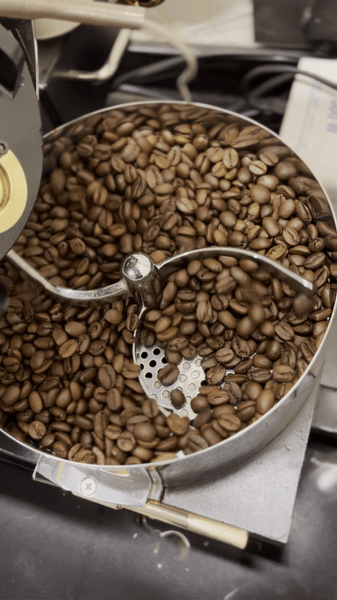
Step 7: Grinding and Brewing
The final step in the specialty coffee roasting process is to grind and brew the beans. Specialty coffee is typically grinded just before brewing to ensure that the flavor is as fresh as possible. The type of grind (coarse, medium, or fine) will depend on the brewing method used.
Specialty coffee roasting is a complex and precise process that requires a deep understanding of the science and art of coffee roasting.
Specialty coffee roasters pay attention to all the details, from sourcing high-quality beans to developing a roasting profile that brings out the unique characteristics and flavors of the beans, to ensure the final product is of the highest quality and taste.
Check out some of our finest collection of specialty coffee.
The Science Behind Specialty Coffee Roasting
The Science Behind Specialty Coffee Roasting is the application of scientific principles and techniques to understand and control the chemical and physical processes that occur during the roasting of coffee beans.
One of the most important scientific principles involved in specialty coffee roasting is the Maillard reaction, which is a chemical reaction between amino acids and reducing sugars that creates hundreds of new flavor compounds. This reaction is responsible for the development of the characteristic flavors and aromas of coffee, such as caramel, nutty, chocolatey and fruity notes.
Specialty coffee roasters carefully control the temperature and duration of the roasting process to optimize the Maillard reaction and bring out the unique characteristics of the beans.
Another scientific principle involved in specialty coffee roasting is the caramelization of the sugars in the beans. Caramelization is a process that occurs when the sugars in the beans are heated to high temperatures, creating a sweetness and dark color in the coffee.
Specialty coffee roasters carefully control the temperature and duration of the roasting process to optimize the caramelization process and bring out the unique characteristics of the beans.
The development of the roast flavor is also a key part of specialty coffee roasting. The roast flavor is a result of the thermal degradation of the coffee components, creating new compounds and modifying existing ones.
The process of developing the roast flavor is complex and depends on the temperature, time, and atmosphere of the roasting process, and the chemical and physical properties of the coffee. Specialty coffee roasters use their knowledge and understanding of these factors to develop a unique and consistent roast flavor.
Specialty coffee roasters also pay attention to the moisture content of the beans during the roasting process. The moisture content of the coffee beans affects the volume expansion, the density, and the color of the beans. It also affects the flavor, aroma and the overall quality of the coffee.
Specialty coffee roasters carefully control the moisture content of the beans to ensure that it is at the optimal level for the best possible flavor and aroma.
Factors that affect the final flavor of the Specialty Coffee
The final flavor of specialty coffee is determined by a variety of factors, including:
1. The origin and variety of the green coffee beans
Different regions and types of coffee beans will have different flavor profiles. Specialty coffee beans are typically sourced from specific regions known for producing high-quality beans, such as Ethiopia, Colombia, Costa Rica, etc.
2. The roasting temperature and duration
The temperature and duration of the roasting process can significantly affect the flavor of the coffee. Specialty coffee beans are typically roasted at a lower temperature and for a shorter period of time than commercial coffee beans, which helps to preserve the unique flavor characteristics of the beans.
3. The roasting profile
Specialty coffee roasters develop a unique roasting profile for each batch of beans, taking into account factors such as the origin, varietal, and quality of the beans, as well as the desired flavor profile.
The roasting profile is a detailed plan that outlines the specific temperature and time at which the beans will be roasted.
4. The moisture content
The moisture content of the coffee beans affects the volume expansion, the density, and the color of the beans. It also affects the flavor, aroma and the overall quality of the coffee.
Specialty coffee roasters carefully control the moisture content of the beans to ensure that it is at the optimal level for the best possible flavor and aroma.
5. The cooling and resting time
The cooling and resting time of the beans after the roasting process is crucial, it allows the flavors to fully develop and for any lingering moisture to evaporate.
6. The grind and brewing method
The grind and brewing method will also affect the final flavor of the specialty coffee. Specialty coffee is typically cursed just before brewing to ensure that the flavor is as fresh as possible and the grind size is chosen based on the brewing method used.
Check out our top of the line specialty coffee equipment to up your brewing game!
Each one of these factors plays a crucial role in determining the final flavor of specialty coffee. Specialty coffee roasters pay close attention to these factors to ensure that the final product is of the highest quality and taste, with a unique flavor profile and aroma.
The origin and variety of the green coffee beans, for instance, are known to have a significant impact on the final flavor of the coffee, as different regions and types of coffee beans will have different flavor profiles.
Similarly, the roasting temperature and duration, roasting profile, and the moisture content of the beans all have an impact on the final flavor of the coffee.
Specialty coffee is a unique product, and the attention to detail and care put into the roasting process is what sets it apart from other types of coffee.

